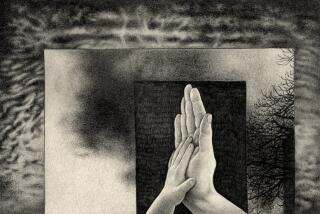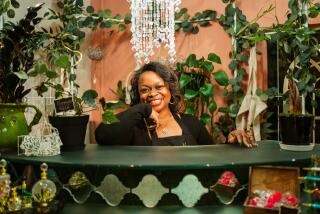Empathy as a Way of Life Dictates Vigil for Peace by a Garden Grove Woman
When she was 9 years old, Linda Dunlap remembers, she was sitting on her bed, reading a book. A quote--she doesn’t remember from whom--seemed to jump off the page.
A man is shot in his temple and I feel the bullet go deep in my head .
“I said, ‘That is exactly how I feel,’ and I have felt that way all of my life,” Linda Dunlap says. “I have always felt the suffering of others. I can’t just feel that it’s none of my business or that I can’t do anything about it.”
There is no boast here, no self-congratulation. The words are matter of fact. That is how Linda Dunlap is. She does what she feels is right, in a moral sense. If somebody notices, so much the better; maybe they too will care. If they do not, it is not her concern.
Linda and I are sitting inside the sanctuary of the Emmanuel Episcopal Church in Fullerton. This is where Linda has lived since the evening of Jan. 16, when the first Allied bombs began ripping through the Baghdad sky.
She and her husband, a Vietnam veteran, had come to pray: Please dear God, let the killing stop . Linda’s church, Roman Catholic, was closed by then. Here, the doors are open 24 hours a day.
“I had no intention of staying,” Linda says. “My husband and I were going to go to the (anti-war) demonstration in Westwood. I had been watching the news--there were lots of police and people were angry--and then I thought that going there would only add to the violence. . . . I didn’t want to do nothing, but I didn’t want to do that, either. I decided to stay here.”
Linda’s voice is calm. She is doing what she must; she will stop doing it when it is time. She seems confident that her point will be made, without stridence, or placards, or jingoistic messages about who’s side somebody is on.
Linda Dunlap is a pacifist, a patriot who believes, quite simply, that war is dead wrong.
“I think we need help, and I am here to ask for help,” she says.
Perhaps Linda, who has worked on behalf of the homeless in the past, could have done that just as well from her home in Garden Grove. The church teaches that God hears the prayers of those who call him, that it doesn’t matter from where.
The letters she is writing to American soldiers, men and women whom Linda supports, could have easily been written from home, her Bible read under more light. By now the sponge baths she takes in the church restroom--where years of nursing experience have served her well--must surely be getting old.
Yet I, and others, would not be talking to Linda if she were not camped out on the pews of this modest neighborhood church. People would not be stopping by, asking that she pray for loved ones in the Persian Gulf, or peeking in on her, for curiosity’s sake, and then offering up their own prayers, as well.
“Because of the publicity, people have come,” Linda says. “I’m touching people’s lives, and that is important to me.”
And the Rev. Paul Edwards, rector of the church, says he likes the idea of Emmanuel Episcopal becoming “a spiritual crash pad.” He is glad that Linda has chosen to bring her message here.
Beginning Friday evening, he says the church will sponsor what will be a monthly “dialogue on war,” 24 hours of music, meditation, speakers, counseling and prayer. Linda, of course, will be here.
But Linda’s vigil, her most public protest against war, is a deeply private homage as well. She is called to her quiet activism in a way that she feels no compunction to dissect.
“I feel that if people don’t understand why I’m here, then I can’t make them,” she says. “And it’s not important with me that they do.”
Linda’s husband, Dave Dunlap, spends his nights with his wife in the church, then showers at home and goes on to work. He has missed only one night, when his daughter, a nursing student, and her boyfriend, a Marine, took his place in the pews.
It’s been rough on him, bringing food and news from home. And his body isn’t fit for sleeping on narrow wood pews. He and Linda, he says, have a water bed at home.
Then too there is the matter of Linda’s health. She has a brain tumor, which has been operated on twice.
Every day for the past year and a half, she has been taking RU-486, the so-called abortion pill, as part of a research project at USC. Linda says the tumor now appears to be shrinking a little.
Still, Linda’s medical problems are immense. The tumor has left her nearly blind. One eye is closed. She is dependent on steroid medication and has an ulcer as well. She is 43 years old.
“I was supposed to be gone by now,” Linda says.
She is talking about her own death.
“I guess God isn’t finished with me here,” she says. “It was something that I sensed, and I have fought very hard to stay here.”
Linda, however, does not like to dwell on her health. Very rarely, she says, does it get her down. There is too little time.
“I have always felt that I have a destiny while I was here,” she says. “As much of a pacifist as I am, one of the men I have most admired is Patton because he felt that sense of destiny too.”
Linda Dunlap says she does not know if she is fulfilling her destiny now, by protesting the slaughter of people in war, yet she feels closer to self-realization than she ever has before.
She is doing what she must.
Dianne Klein’s column appears Tuesday, Thursday and Sunday. Readers may reach Klein by writing to her at The Times Orange County Edition, 1375 Sunflower Ave., Costa Mesa, Calif. 92626, or calling (714) 966-7406.


